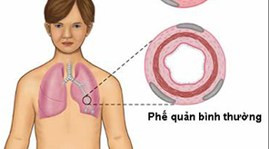Prevent asthma attacks during seasonal changes
In people at higher risk of asthma, a preventive medication regimen including bronchodilators, inhaled corticosteroids… should be used.
The changing weather, the hot and cold temperatures are favorable conditions for the outbreak of many chronic diseases. Especially for people with bronchial asthma due to sensitivity to the environment, and poor prevention can sometimes lead to the onset of a malignant asthma attack which is extremely dangerous.

Symptoms of acute bronchial asthma
Asthma attacks often appear with signs such as fatigue, headache, and increasing difficulty breathing. There are also cases where patients have severe spasms, acute respiratory failure, and death. Patients have difficulty breathing when exhaling, panic, cold sweats, respiratory muscle contractions, and most notably, a wheezing or wheezing sound. Patients breathe very heavily, their chest feels tight and compressed, and they often have to sit up and hold on to the bed to breathe.
Patients also often have a lot of cough with white, sticky or thick phlegm; or high fever and cough with yellow phlegm if there is an infection (secondary infection). Listening to the patient's lungs, there is full of crackles (wheezing or rales). If not treated, the asthma attack will gradually worsen, turning into a critical condition with signs such as slow, irregular pulse, low blood pressure, coma, gasping, and "silent" lung auscultation. Having these signs means that the patient is about to die.
Factors that trigger asthma attacks
The leading factors causing allergies are pollen, animal hair, chemicals, mold, dust... It is believed that these agents, after being inhaled into the respiratory tract, will stimulate immune cells to release substances such as histamine, serotonin which have the properties of causing spasms and edema, increasing secretion very strongly in the bronchioles causing asthma attacks. In addition, allergies through other routes such as food allergies (jellyfish, shrimp, crab...), drug allergies, chemicals... can also trigger asthma attacks in people with sensitive constitutions and in many cases the symptoms are very severe.
Bacterial and viral infections play a significant role in the onset of acute asthma. There is strong evidence to support upper respiratory tract infections caused by viruses and mycoplasma pneumoniae as important triggers for asthma attacks. Viruses such as R. syncytialvirus, parainfluenza, influenza A, rhinovirus, and adenovirus have also been implicated.
Excessive physical exertion is also a trigger for asthma attacks in some people. During vigorous exercise, the need for oxygen increases, causing the patient to breathe faster, the airflow in and out of the bronchi is faster and stronger, less humidified and warmed, causing irritation of the bronchioles in sensitive people and asthma attacks occur.
Other factors such as low temperature; environmental pollutants such as dust, smoke, cigarette smoke also often cause asthma attacks. Some drugs such as beta-blockers that upset the balance between the sympathetic and parasympathetic systems, aspirin, ibuprofen, sulfites and additives, and food colorings can trigger or aggravate asthma.
Asthma attacks are also at risk of flare-ups in people with severe psychological stress, strong emotions (such as excessive joy or sadness) and finally, gastroesophageal reflux and menstrual cycles are also the "culprits" that initiate an acute spasm in sensitive people.
Who is susceptible to asthma?
Asthma attacks only occur in people with underlying risk factors. The first risk factor is family factors (genes). A person will be at risk of asthma when exposed to irritants if there is a blood relative (parent, sibling...) in the family with bronchial asthma. The second is people with allergies or who often suffer from allergic diseases such as sinusitis, atopic dermatitis. These people are at high risk of acute bronchospasm (asthma) when exposed to allergens. People also list a number of other subjects that are susceptible to bronchial asthma such as obese people; smokers (including passive smokers); people whose mothers smoked during pregnancy, people who are regularly exposed to dust and pollutants, toxic chemicals or dust in factories and people born prematurely.
How to prevent and control asthma attacks?
Although not absolute, it is entirely possible to prevent the occurrence of asthma attacks. First of all, for those at high risk of asthma (family history, allergic constitution...), they should avoid contact with allergens such as pollen, dust, chemicals, and cigarette smoke.
People with asthma caused by exertion or medication should absolutely not overexert themselves or reuse medications that previously triggered an asthma attack. People with occupational asthma should change their working environment to a more suitable one. Prevention of upper respiratory tract infections is also necessary for people who have had asthma, and this should be especially important in the cold season. Maintaining a reasonable body weight, light physical exercise, and a good diet also contribute significantly to preventing the onset of asthma attacks. In people at higher risk, a preventive medication regimen including bronchodilators, inhaled or oral corticosteroids should be used as directed by a doctor to prevent asthma attacks./.
According to (vov.vn) - M.D






